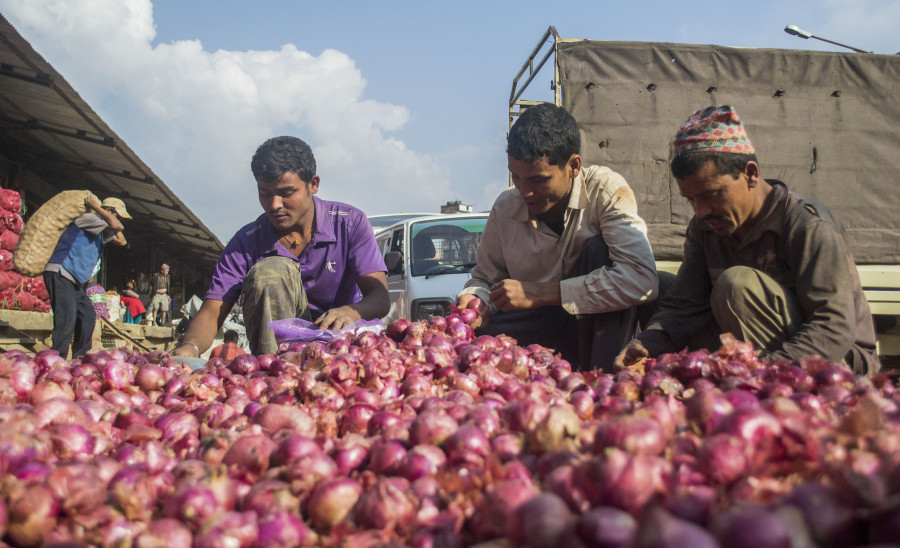Money
Nepal turns to China for onions after Indian ban
Chinese onions cost Rs195 per kg while smuggled Indian onions cost Rs225 per kg, according to traders.
Krishana Prasain & Balram Ghimire
Kathmandu's vegetable markets are not shedding tears over the loss of onion shipments from India. The traders have quickly turned north to fulfil the demand for the essential cooking ingredient, the price of which has risen steeply in the past few months after India imposed a ban on exports, triggering frantic buying and resultant shortages.
Chinese onions started flowing into Kathmandu’s markets almost immediately after supply from India ceased. Traders say that if the trend continues, the fiery red bulbs could make the list of largest imports from across the Himalaya.
In fiscal 2018-19, Nepal bought goods worth Rs917 billion from India, accounting for 64.7 percent of total imports. Nepal's imports from China were valued at Rs205 billion, accounting for 14.5 percent of imports.
India slapped a ban on onion exports in September to maintain domestic availability, causing severe shortages over Asia, including Nepal.
Smugglers jumped to take advantage of the embargo, and they started slipping the vegetable into the country through the leaky Nepal-India border. The price of contraband onions hit a new high of Rs250 per kg in the Kathmandu Valley, costing the same as chicken meat.
The statistics of the Customs Department show that Nepal imported 823 tonnes of Chinese onions worth Rs42.26 million through the Rasuwagadhi border point in the last two months. Onion imports from China during the same period last year were zero.
The customs value of Chinese onions is Rs50 per kg, but the price swells to Rs195 per kg by the time they reach the customer in Kathmandu at the end of the supply chain. Smuggled onions from India cost Rs225 per kg, according to multiple traders with whom the Post spoke. Nepal is fully dependent on imported onions.
Binaya Shrestha, deputy director at the Kalimati Fruits and Vegetables Market Development Committee, said that the reason behind the high price of Chinese onions was transportation costs. “It takes more than a week for the commodity to arrive in Kathmandu from China,” Shrestha said.
According to him, domestic traders are complaining that they are not getting much profit by selling Chinese onions.
Onion trader Anil KC, who used to sell Indian onions until a few months ago, has been selling Chinese vegetables following unexpected demand. KC says he gets Chinese onions from his supplier at Rs120-160 per kg, depending on the quality.
According to him, the cost of onions imported from China has jumped to Rs10,000-12,000 per sack from Rs1,000-1,500 per sack.
“The sudden rise in freight charges is due to overwhelming demand,” he said, adding that it takes at least 10 days to transport onions from China to Kathmandu over poor roads. “Besides, the freezing weather at the northern border points has made it difficult for traders to bring onions,” said KC.
Suppliers said that the onion shortage in Asia had pushed up prices in China too.
Punya Bikram Khadka, chief of the Rasuwagadhi Customs Office, said onion imports from the north started rising after the southern neighbour imposed a ban.
On September 29, India’s Union Ministry of Commerce and Industry amended its export policy of onion from ‘free to prohibited’ till further orders, which means exports of all varieties of onions were prohibited.
According to Khadka, in a single month from mid-November to mid-December, onion imports from China amounted to 573 tonnes.
The country has not been able to produce onions compared to the domestic requirement and is almost totally dependent on India. Shrestha said that traders had initially been smuggling onions from India, but after the border was tightened, the flow dried up.
“Now, onion shipments coming from the south have dropped to almost zero,” he said. “But Chinese onions have given a respite to the Nepali market,” said Shrestha.
In the last fiscal year, Nepal imported onions worth Rs5.62 billion from India.
Nepal’s trade with China is not easy due to geographical difficulties. Commerce becomes more difficult during the winter when the Chinese highways are snowed over, according to traders.
In October 2015, China donated 1.3 million litres of petrol to Nepal to cope with a severe fuel crisis created by India’s trade embargo. Nepal Oil Corporation had brought the fuel granted by the northern neighbour through Kerung.




 23.12°C Kathmandu
23.12°C Kathmandu














